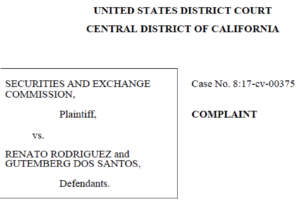Types Of SEC Cases: Pyramid Scheme
SEC Settles Pyramid Scheme Charges Against Promoters
The U.S. Securities and Exchange Commission (“SEC”) settled charges against two individuals for the promotion of a pyramid scheme and the misappropriation of investors’ funds. The individuals were doing business as Vizinova. The two individuals incorporated Vizinova in Mexico, using Mexican nationals as nominees. Neither the individuals nor Vizinova were registered with the SEC.The Pyramid Scheme Part 1: Vizinova’s “Point” System
In its court Complaint, the SEC accused Renato Rodriguez of Downey, California, and Gutemberg Dos Santos of Las Vegas, Nevada (the “defendants”), of running a pyramid scheme out of Southern California. The defendants’ intention was to defraud investors through Vizinova.
The SEC’s court Complaint
The Pyramid Scheme Part 2: Earning Points By Recruiting New Investors
The SEC also alleged that Rodriguez and Dos Santos enticed investors through what they represented was a multilevel marketing scheme. Vizinova investors were given an initial number of points that they were told could be redeemed at a later time for a profit. Investors were told they could accumulate more points by recruiting additional investors to Vizinova. The more new investors an original investor recruited, the more points he/she would receive, and the more valuable each point would become. Investors were supposedly told that at some future redemption period, they could redeem their points for merchandise or covert them to cash. In order to receive cash, investors were told that they would have to purchase a prepaid debit card from Vizinova for $49. According to the Complaint, Vizinova had no substantive business, and “very few products existed or were purchased or sold.” The “points” were worthless and would never be redeemable. As set forth in the Complaint, from September 2013 to September 2014, Rodriguez and Dos Santos raised approximately $5 million from roughly 100 investors. They misappropriated almost 30% of that amount (approximately $1.8 million) for their personal use.
The SEC’s press release
Settlement: Disgorgement And Penalties
In a press release about the case, the SEC stated that Rodriguez and Dos Santos agreed to settle the charges as follows:- $1.4 million in disgorgement
- $160,000 penalty paid by Rodriguez
- $160,000 penalty paid by Dos Santos
Whistleblowers Can Report A Pyramid Scheme To The SEC
This case illustrates some types of misconduct that could give rise to SEC whistleblower cases if reported to the Commission through the SEC whistleblower program. However, the SEC has not made any public statement as to whether this case was itself an actual SEC whistleblower case. The SEC Office of the Whistleblower posts Notices of Covered Action (“NoCA”) for Commission actions where a final judgment or order results in monetary sanctions exceeding $1 million. The NoCA list does not disclose if a particular Enforcement action was brought as the result of an SEC whistleblower case, tip, complaint, or referral being filed with the Commission.Additional Information
For more information about pyramid schemes, click on the links below:- The SEC’s Press Release announcing the settlement. (External link to the SEC’s website.)
- The SEC’s court Complaint in SEC v. Rodriguez and Dos Santos. (External link to the SEC’s website.)







